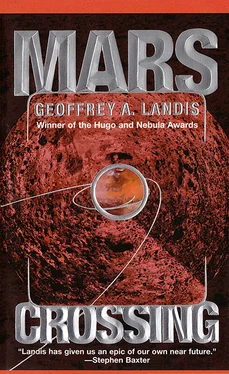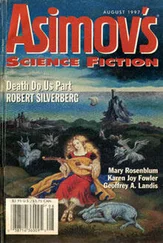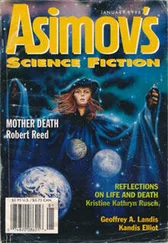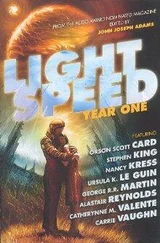Geoffrey A. Landis
Mars Crossing
All great and honourable actions are accomplished with great difficulties, and must be both enterprised and overcome with answerable courages.
—William Bradford,
Of Plymouth Plantation (1621)
Mars tugs at the human imagination like no other planet. With a force mightier than gravity, it attracts the eye to its shimmering red presence in the clear night sky. It is like a glowing ember in a field of ethereal lights, projecting energy and promise.
—John Noble Wilford,
Mars Beckons (1990)
FOR THE CAJUN SUSHI HAMSTERS
THANKS
Don Quijote approached Mars in perfect silence.
At one end of the spacecraft was the habitat, a squat, rounded cylinder sitting on a heat shield. It was separated from the main rocket engine and now-empty fuel tanks by two kilometers of tightly stretched rope, a super-fiber tether so thin as to be nearly invisible. The spacecraft and the fuel tanks slowly rotated around the center of the tether.
“Arm tether separation.”
“Tether separation armed.”
“Navigation?”
“Nav is go.”
“System status?”
“Systems are go.”
Mars loomed, crescent in the sky, a mottled brick of craters and wispy shreds of cloud.
“Check terminal descent engine preheat.”
“TDE preheat on.”
“Check parachute deploy preheaters.”
“PD preheat on.”
“Fire pyros for tether sep on my mark. Three, two, one, now.”
The spacecraft jerked, and the tether, suddenly cut free, recoiled away from the spacecraft, writhing and twisting like an angry snake. The engines, solar arrays, and fuel tanks sailed slowly off into the distance. They would miss Mars and sail outbound on an endless trajectory into interplanetary space.
“Tether separation confirmed. We’re committed.”
“How’s the trajectory?”
“We’re on the numbers. Looking good.”
“Instrument check.”
“Instruments green.”
“Everything green. We’re sliding right down the groove.”
“Then buckle up, everybody. We’re going in.”
The spacecraft burned through the Martian atmosphere, leaving a trail of fire across a pink sky.
A parachute bloomed, another, and a third; bright yellow flowers blossoming in a lifeless sky. A moment before it hit the ground, the heat shield fell away from the back of the vehicle, and a landing cushion mushroomed out of the bottom. At the instant of contact, a cloud of orange dust billowed up into the air, painting the bottom part of the spacecraft with yellow-brown dirt. The spacecraft tilted, swayed at the edge of falling over, and then rocked back toward vertical as the airbag deflated.
“Engines off, tank pressurization off, APU status green, all systems looking good. We’re down. Navigation, you got a position?”
“Working on it…Looks like we hit the kewpie. Should we say something for the history books?”
“Nah. I don’t think anybody is going to write down what gets said by the third expedition to Mars.”
“Tell me it ain’t so. You saying that we’re not going to get a parade when we get back?”
“You got it. Welcome to Mars.”
Having an adventure shows that someone is incompetent, that something has gone wrong. An adventure is interesting enough—in retrospect. Especially to the person who didn’t have it.
—Vilhjalmur Stefansson,
My Life with the Eskimo
There is no easy way into another world.
—James Salter,
Solo Faces
Through the viewport there was nothing but a yellow-pink fog. Then, slowly, the fog faded, and the ridged plains of Felis Dorsa emerged out of the haze, at first misty and colorless, and then, as the dust raised by the landing thinned out, sharply delineated.
John Radkowski looked across the landscape at plains of sand gently undulating beneath a pale butterscotch sky.
Mars.
It was hard for him to contain his fierce joy. Mars!
He wanted simultaneously to cry, to laugh, and to shout out a loud cry of exaltation. He did none of these. As mission commander, it was his duty to keep the mission businesslike. Decades in the astronaut corps had taught him that showing his emotions, even for such an event as landing on Mars, was a move that would, down the line, give him a reputation for being emotional, and hence unreliable. He stayed silent.
At fifty, John Radkowski was the oldest member of the crew, and the one most experienced in space. He was short, wiry rather than overtly muscular, with gray hair cropped closely to his head. His eyes had the slow, restless motion of long years of training; he focused on the task at hand, but always part of his attention was glancing around the cabin, looking up, down, checking for that small forgotten out-of-place something that might spell trouble for the mission. One hand, his left, was missing three fingers. His crew knew better than to offer him help.
Mars! After all the decades of work, he had finally made it!
There was work to do. As commander, the other five crewmembers depended on him to get the mission done safely and bring them back home. He had better get working.
The crew was occupied with their landing tasks, shutting the flight systems down and bringing the surface operation systems up, then verifying that they were running according to spec. He knew that all of them wanted to stop their work and crowd to the viewport, but for the moment they were all too busy, even Trevor, and so he had the viewport to himself.
Off to the southeast, close enough to be easily visible through the residual pink haze, was the squat form of Dulcinea .
The field glasses consisted of a flat rectangle, about the size of a paperback book. They had been designed to function equally well with or without a space-suit helmet. He raised them to his eyes. The computer adjusted the focus to match his eyesight, and the result was as if he were looking through a window at a magnified view of the landscape.
Like Chamlong said, they had hit their landing site right on the nail, with Dulcinea no more than half a mile away. That was of critical importance to them: Dulcinea was their way home, a fully fueled return vehicle that had landed on Mars six and a half years earlier. He examined her minutely, then examined the ground between the landing site of Quijote and the return vehicle. It was sand, sculpted by a million years of intermittent wind into hillocks and waves. There was an assortment of randomly scattered rocks, some boulder-sized, half-buried beneath the sand, but he saw no obstacles to their easy travel. Good.
The viewport forgotten, he turned to the copilot’s console. The floor was tilted at an odd angle; the lander must have set down on a slope, and he had to move carefully to avoid falling. He studied the sequence of images taken during landing. Both visual and radar images had been taken, and he plotted them as a topographical map of the terrain. Again, he saw no obstacles. Good.
When he got up, he saw that Trevor, Estrela, and Chamlong were all crowded around the viewport, pushing each other out of the way to jockey for a view of Mars. He smiled. They must have been watching for the very instant he had vacated the position.
“Why look out the window when we can go out and see for ourselves?” he said. “Get your suits ready, gang, it’s time to go outside and play. Get a move on; in six weeks we’ll have to go home, and we’ve got a full schedule before we go.”
Читать дальше












